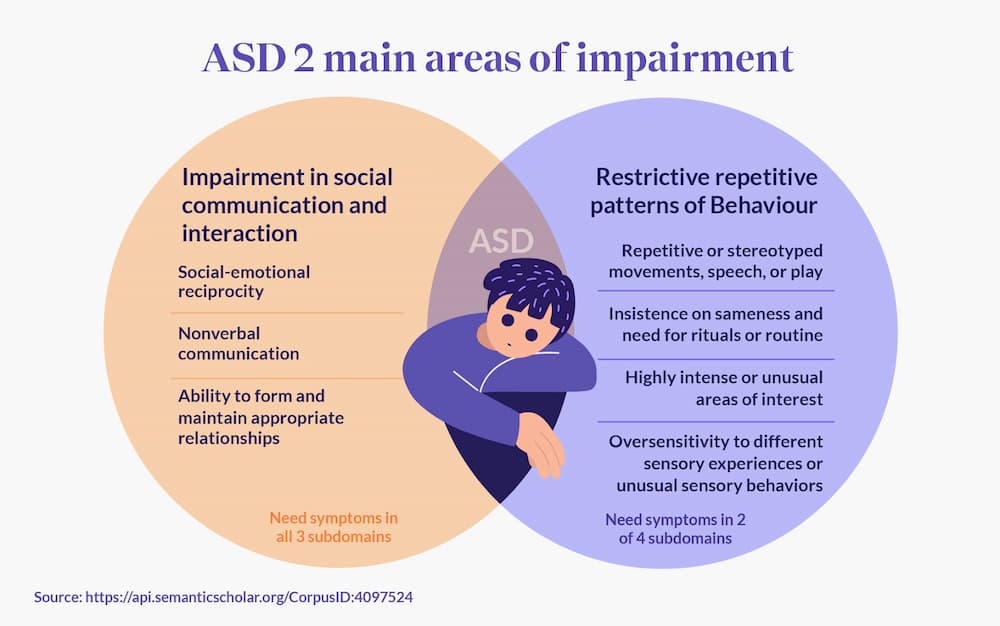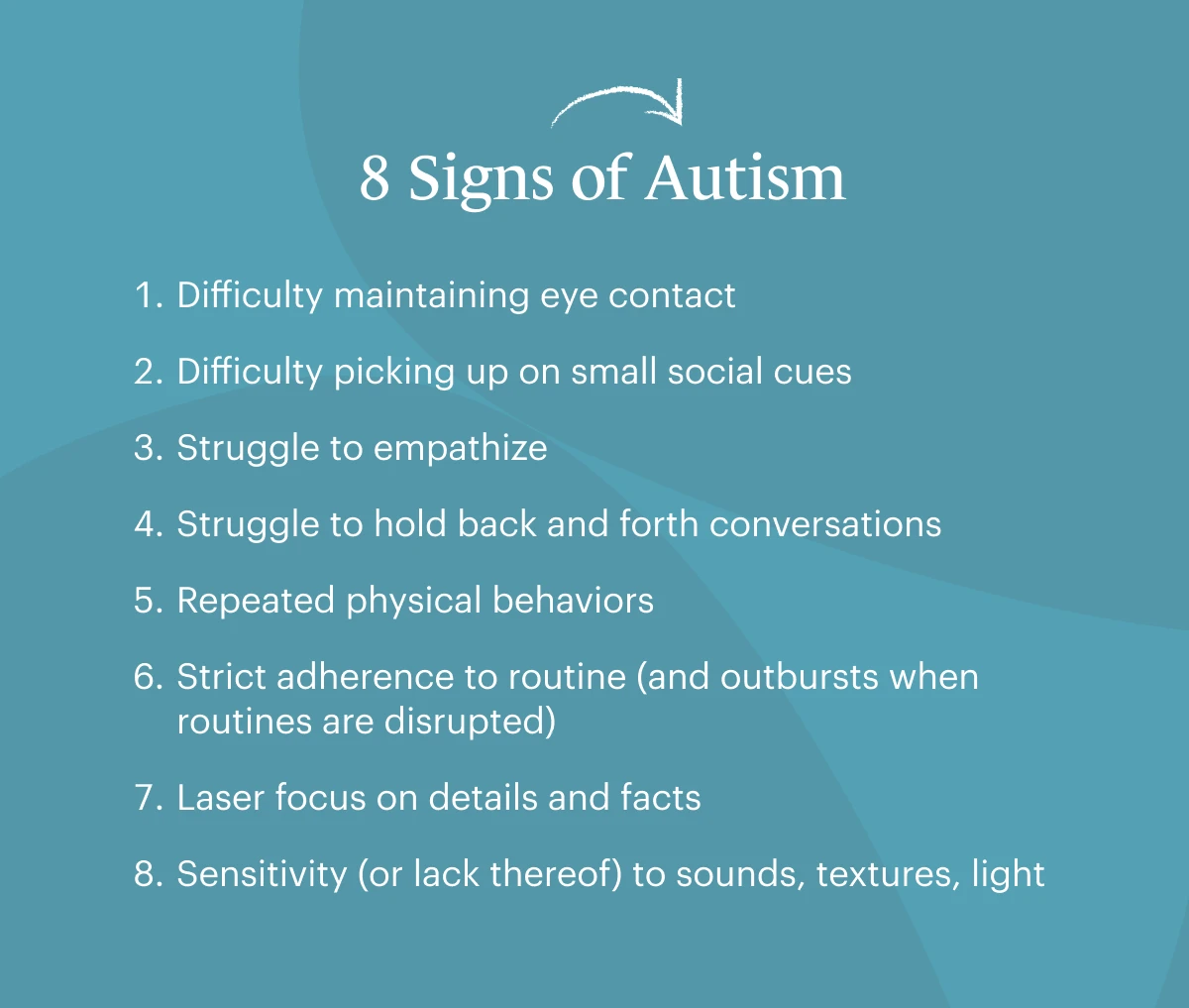Key Symptoms And Signs to Recognize in Individuals With Behavior Autism
When you come across a person with behavioral autism, identifying crucial indicators and signs is important. You could observe difficulties in social communications and communication, in addition to a solid requirement for routines. Furthermore, sensory level of sensitivities can lead to overwhelming experiences. Recognizing these characteristics can boost your assistance and interventions, yet there's even more to reveal regarding how these behaviors materialize in day-to-day situations. Let's explore what these indications truly resemble.
Obstacles in Social Communications
When you connect with someone on the autism range, you could see they deal with social hints and communication. These difficulties can make social communications feel frustrating for them. You might see them staying clear of eye contact or standing too close or as well far throughout discussions, which can produce misconceptions. They might not pick up on body language or faces, making it harder for them to determine how others are really feeling.
Additionally, you might locate that they favor regimens and familiar settings, which can limit their desire to participate in brand-new social scenarios. They may speak concerning their passions in excellent detail without noticing if you're interested when they do involve. This can result in discriminatory discussions that leave you really feeling separated. Understanding these obstacles can assist you come close to communications with empathy and persistence, promoting a much more comfortable atmosphere for both of you.
Trouble With Verbal and Non-Verbal Interaction

Acknowledging these indications is crucial, as it aids you better support and engage with individuals on the autism range. By understanding their communication challenges, you can foster a lot more meaningful links and give an extra encouraging setting.
Recurring Actions and Regimens
Communication difficulties typically go along with other signs of autism, such as repetitive actions and a solid preference for routines. You might discover that individuals with autism usually take part in details, repeated actions, like hand-flapping, shaking, or repeating phrases. These actions can supply convenience and a feeling of control in an usually frustrating world.
When they adhere to an organized routine,Routines are just as crucial; numerous individuals thrive. You might find that adjustments to these routines can result in significant distress. For instance, if they have a daily ritual of consuming breakfast at a details time or following a specific course to institution, any interruption can trigger anxiety.
Recognizing these patterns assists you recognize their behavior and offer assistance. By accommodating their requirement for regular and allowing repetitive actions, you can produce a more comfy environment that alleviates their obstacles.
Sensory Level Of Sensitivities

Common Sensory Triggers
Sensory sensitivities can significantly influence every day life for people with autism, as certain stimulations typically trigger frustrating reactions. Usual sensory triggers include loud sounds, bright lights, and solid smells. You could discover that unexpected audios, like alarm systems or sirens, trigger stress and anxiety or distress. Similarly, fluorescent illumination in shops can really feel awkward and rough. Appearances can also play a considerable role; harsh materials or specific food appearances might be intolerable for you. Additionally, crowded places can bewilder your senses, making it tough to relax or concentrate. Understanding these triggers can aid you manage your environment much better. By understanding what influences you, you can take steps to lessen discomfort and boost your daily experiences.
Behavioral Feedbacks Discussed
Understanding your visit this website behavior reactions to sensory sensitivities is important, browse this site as they typically expose how you interact with the world. You could see that particular audios, lights, or textures overwhelm you, causing anxiety or pain. When faced with these stimuli, you might take out, cover your ears, or perhaps respond aggressively. These actions aren't just peculiarities; they're your means of managing overstimulation. You might also discover on your own looking for specific sensory experiences, like deep pressure or peaceful atmospheres, to assist ground on your own. Recognizing these patterns assists you understand your requirements far better and can lead exactly how you connect them to others. By acknowledging your sensory level of sensitivities, you can work in the direction of developing an environment that feels extra workable and comfortable for you.
Coping Methods Overview
Acknowledging your sensory level of sensitivities is just the very first step; now it's time to discover coping approaches that can assist you handle those experiences successfully. Start by creating a sensory toolkit customized to your needs. Developing a structured routine can also offer predictability, minimizing anxiousness around sensory overload.
Restricted Passions and Emphasis
While lots of people create a large range of rate of interests, those with autism usually demonstrate restricted passions and an intense concentrate on particular topics. You may notice that somebody with autism can invest hours delving into their preferred topic, whether it's a certain sort of train, a specific movie, or a clinical principle. This intense focus isn't just a pastime; it can come to be a central part of their identification and social communications.
You might discover that discussions focus on these passions, and they may have a hard time to take part in more comprehensive topics. For them, these concentrated interests offer comfort and a sense of proficiency. While it is very important to motivate expedition of new subjects, appreciating their interests is similarly essential. By understanding and acknowledging these limited passions, you can promote a supportive atmosphere where they really feel valued and comprehended, enabling more purposeful connections and communications.
Emotional Regulation Difficulties
Individuals with autism often face challenges in psychological policy, which can be affected by their intense focus on particular passions. You may discover that when a person is deeply involved in a favored activity, they can experience strong emotions, whether exhilaration or disappointment. This intensity occasionally makes it tough for them to shift equipments or manage their sensations when points don't go as planned.
Irregularity in Developing Milestones
When it comes to developmental landmarks, you'll observe that individuals with autism frequently show a wide variety of variability. You could see a kid excel in language skills however struggle with social communications.
It's important to acknowledge that each individual's journey is one-of-a-kind. Some may create complex abilities early, just to encounter obstacles later on. Others may take longer to achieve fundamental milestones but then thrive in details locations. Observing these patterns can aid you understand their strengths and needs much better.
Often Asked Concerns
Exactly How Is Autism Detected in Kid and Grownups?
To detect autism in children and adults, professionals evaluate actions, interaction skills, and social communications. If a specific fulfills the criteria for autism range disorder., they usually utilize standardized tests, meetings, and monitorings to determine.
Are There Different Types of Autism Spectrum Disorders?
Yes, there are different kinds of autism range problems, including Asperger's disorder and pervasive developing disorder-not otherwise specified. Each kind differs in severity and attributes, so understanding these differences can aid you better support individuals with autism.
What Therapies Work for People With Autism?
When considering reliable therapies for individuals with autism, you'll discover alternatives like Applied Actions Evaluation, speech treatment, and job-related therapy. Each technique can aid boost interaction, social skills, and daily working tailored to private requirements.
Can People With Autism Lead Independent Lives?
Yes, individuals with autism can lead independent lives. With the ideal assistance, abilities training, and sources, you can aid them develop self-sufficiency, manage daily tasks, and thrive in numerous settings, cultivating their independence.
Just How Can Family Members Assistance Liked Ones With Autism?
You can support your loved ones with autism by creating a structured setting, motivating their passions, exercising persistence, promoting communication, and advertising social skills. Celebrate their success, no issue exactly how tiny, and construct a helpful neighborhood.
Although many people on the autism spectrum can comprehend and utilize language, they often encounter substantial challenges with both spoken and non-verbal interaction. Recognizing these signs is crucial, as it aids you better assistance and involve with individuals on the autism range. You might observe that individuals with autism usually engage in certain, repeated activities, like hand-flapping, rocking, or duplicating expressions.Sensory sensitivities can considerably affect daily life for individuals with autism, as certain stimuli commonly cause frustrating responses.When it comes to developmental milestones, you'll notice that individuals with autism often show a vast variety of irregularity.
Comments on “Discussing the spectrum with siblings—tips from an Aba Therapist”